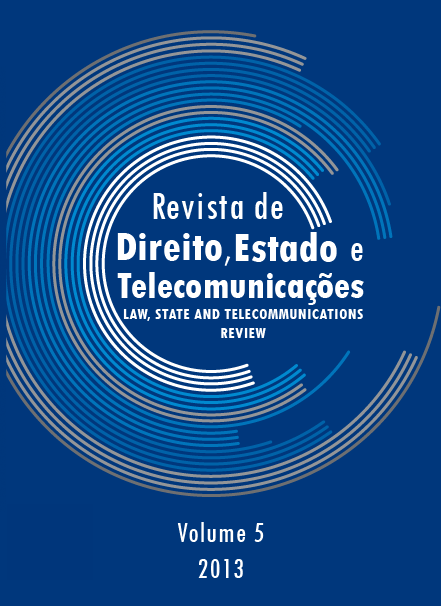Cellphone Masts deployment in Brazil: Case Studies and Assessment of the Judicial Disputes between Governmental Entities
DOI:
https://doi.org/10.26512/lstr.v5i1.21562Keywords:
telecommunications, mobile phones, judicial disputes, environmental issues, BrazilAbstract
Purpose ”“ The paper details judicial disputes over telecommunications regulation and environmental issues regarding mobile phone infrastructure in the nowadays Brazil. It shows how such typical conflicts happened in comparison with some international cases.
Methodology/approach/design ”“ The research applied comparative methods and qualitative analysis, by pinpointing international cases in order to enlighten the Brazilian situation, and its dispute resolution system. The comparison demonstrates that it was public entities and authorities that brought conflicts in the Brazilian judicial system, instead of civil society groups.
Findings ”“ Such issues related to the mobile phone infrastructure do not give rise to social mobilization in Brazil, neither through associations, nor through public debate. That agenda is captured by large by public entities and authorities as diagnosed by the Brazilian judicialization of politics studies (Werneck Vianna et al., 1999).
Practical implications ”“ The paper enlightens a phenomenon scarcely researched in Brazil that has consequences over utilities and infrastructure public policies. It is important for the national development debate also due to its impact on licensing and technical precaution costs.
Originality/value ”“ The paper aims to fill a gap in the literature, as well as to stimulate a methodological option by building bridges among legal studies analyses, sociology, and other social sciences.
Downloads
References
ANUATTI-NETO, Francisco; BAROSSI-FILHO, Milton; GLEDSON DE CARVALHO, Antonio; MACEDO, Roberto. Costs and benefits of privatization: evidence from Brazil. In: CHONG, Alberto; LÓPEZ-DE-SILANES, Florêncio (orgs.). Privatization in Latin America: myths and reality. Palo Alto, CA: Stanford University Press, World Bank, 2005.
ARANTES, Rogério Bastos. Direito e política: o ministério público e a defesa dos direitos coletivos. Revista Brasileira de Ciências Sociais, v. 14, n. 39, p. 83-102, fev. 1999.
BECK, Ulrich. Risk society: towards a new modernity. London: Sage, 1992.
BURGESS, Adam. Cellular phones, public fears, and a culture of precaution. Cambridge: Cambridge University Press, 2004.
_____. Comparing national responses to perceived health risks from mobile phone masts. Health, risk, and society, Carfax Pub., vol. 4, n. 2, p. 175-188, 2002.
_____. The contemporary emergence of health concern related to mobile phones: a study of the origins and diffusion of the mobile phones fears and anti-EMF campaigns. Saarbrücken: VDM, 2010.
CASTELLS, Manuel. The rise of the network society. Oxford: Basil Blackwell, 1996.
CASTRO, Marcus Faro de. O Supremo Tribunal Federal e a judicialização da política, Revista Brasileira de Ciências Sociais, v. 12, n. 34, p. 147-156, 1997.
DRAKE, Francis. Mobile phone masts: protesting the scientific evidence. Public Understanding of Science, Sage Pub., vol. 15, n. 4, p. 387-410, 2006.
GIDDENS, Anthony. The consequences of modernity. Stanford, CA: Stanford University Press, 1991.
MACGUIGAN, Jim. Cultural analysis. London: Sage, 2010.
PAULINO, José Osvaldo Saldanha. Radiações eletromagnéticas não ionizantes emitidas pelas antenas fixas de telefonia celular. Belo Horizonte: Fundação Christiano Ottoni/UFMG, maio 2001.
ROSANVALLON, Pierre. Democratic legitimacy: impartiality, reflexivity, proximity. New Jersey: Princeton University Press, 2011.
SILVA, José Afonso da. Do recurso extraordinário no direito processual brasileiro. São Paulo: Revista dos Tribunais, 1963.
TATE, C. Neal; VALLINDER, Torbjörn. The global expansion of judicial power. New York, NYU Press, 1995.
URRY, John. Sociology beyond societies: mobilities for the twenty-first century. London: Routledge, 2000.
WAGNER, Peter. A sociology of modernity: liberty and discipline. London: Routledge, 1994.
WERNECK VIANNA, Luiz [et al]. Judicialização da política e das relações sociais no Brasil. Rio de Janeiro: Revan, 1999.
Downloads
Published
How to Cite
Issue
Section
License
By submitting this paper to the Law, State and Telecommunications Review,
I hereby declare that I agree to the terms of the Creative Commons Attribution 4.0 International (CC BY 4.0).


